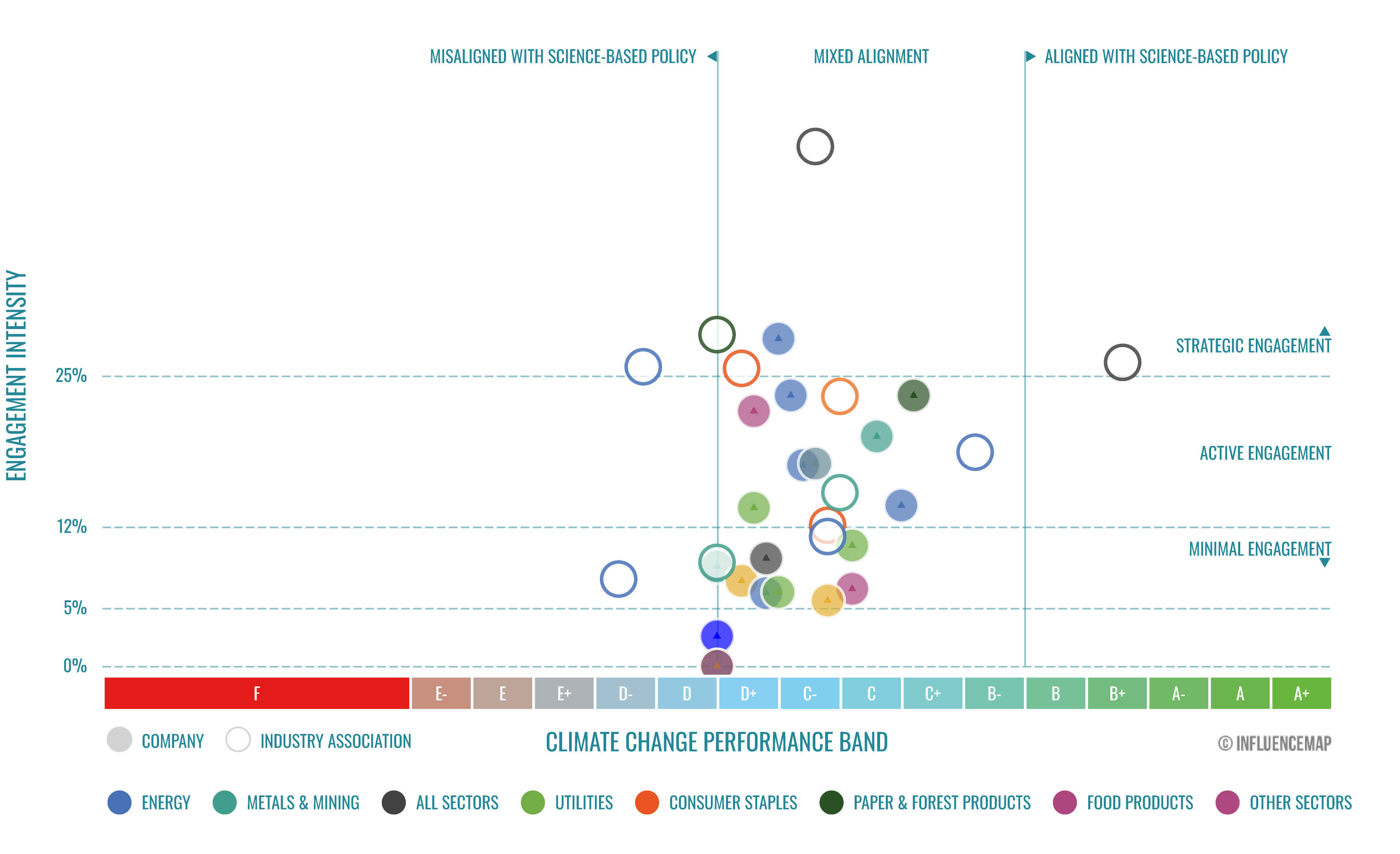New analysis of how companies in Brazil engage with climate policies reveals that most companies and industry associations are failing to engage strategically in the policy process, leaving key regulations vulnerable to lobbying from a minority of highly engaged actors, mostly in the oil and gas and agricultural sectors.
Entities operating in the oil and gas and agricultural sectors in Brazil not only engage significantly more than other sectors but also take the most negative positions on climate policy in the region, regularly repeating successful tactics and talking points from the wider fossil fuel lobby to delay and derail climate policy. This imbalance in engagement between positive and negative actors has left regulations such as RenovaBio and the Selective Tax vulnerable to lobbying from oppositional actors, even while the Brazilian government had committed to more ambitious policies as the COP30 host country.
For this research, InfluenceMap assessed 20 of the most climate-significant companies and 12 of the largest industry associations in Brazil. Overall, InfluenceMap detected broad top-line support for climate policy across sectors, tying in with the Brazilian government’s implementation of milestone climate policies in the run-up to COP30 in Belém. However, this support has been overshadowed by the government’s approval of new fossil fuel development in Brazil, the result of an active campaign by the fossil fuel sector to maintain oil and gas exploration and production in the country.
Of the entities assessed, only one industry association, the Brazilian Business Council for Sustainable Development, is found to undertake climate lobbying that supports science-aligned pathways to deliver the 1.5°C warming goal of the Paris Agreement.
None of the companies assessed is found to take fully science-aligned lobbying positions. Notably, the vast majority of entities tracked (81%) do not demonstrate a strategic level of engagement on climate policy. This means that, in practice, many companies that express high-level support for climate policy are not following through with the detailed engagement required to ensure that these policies are developed in line with science-based guidance.

The entities that are strategically engaged on climate policy all operate in the energy or agriculture sectors or are cross-sector associations: the Confederation of National Industry (CNI), the Brazilian Tree Industry Association (Ibá), the Brazilian Institute of Oil and Gas (IBP), the Brazilian Business Council for Sustainable Development (CEBDS), and the company Petrobras.
Between 2023 and 2025, InfluenceMap identified more than 50 public instances of direct advocacy by oil and gas companies and industry associations to regulators, calling for increased oil and gas exploration and/or production. During the same period, in their public messaging, the leaders of these oil and gas companies and industry associations - including the CEO of Petrobras and the President of IBP - were found to have promoted narratives and measures that are misaligned with IPCC guidance on the energy transition at least 83 times.
However, this negative advocacy only represents one half of the sophisticated strategy employed by the oil and gas industry in Brazil. The other half involves positive, high-level messaging from fossil fuel groups, including Petrobras, acknowledging the need to respond to climate change and deliver on the Paris Agreement goals. This discrepancy appears to be part of a wider strategy to control the narrative in the run-up to COP30 by publicly presenting fossil fuel entities as positive and proactive actors—despite substantial evidence of strong advocacy for energy pathways that contradict the IPCC's science-based guidance.
A lack of comprehensive transparency surrounding corporate engagement with regulatory processes in Brazil is also likely to be giving opponents of climate policy an unfair advantage, allowing these actors to influence climate policy without public or investor scrutiny.
This briefing is an initial analysis of the lobbying landscape in Brazil. InfluenceMap will continue to track developments through its new Brazil Platform, including monitoring engagement on specific policies such as RenovaBio and Selective Tax.
Venetia Roxburgh, Program Manager for Brazil and Latin America at InfluenceMap, said:
InfluenceMap’s first assessment of the corporate landscape in Brazil has revealed that a lack of engagement in most of the economy has left much-needed climate policy vulnerable to delay and derailment by highly active fossil fuel and agricultural players, even as the country prepares to host COP30. For ambitious climate policy to make change in the real economy, positive actors need to come together to push back on these negative influences and make their voices heard.
Click here to read the full briefing
Kitty Hatchley, Media Manager, InfluenceMap (London)
Email: kitty.hatchley {@} influencemap.org